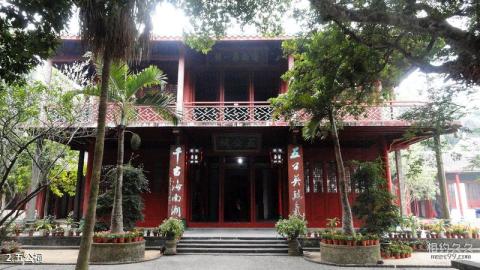
Introduction to the Wugong Temple: Built in the 15th year of the reign of Emperor Guangxu of the Qing Dynasty (1889 AD), the temple worships five virtuous ministers, prime ministers, and loyal men who were demoted to Hainan during the Tang and Song Dynasties. They are: Li Deyu, Li Gang, Zhao Ding, Hu Quan and Li Guang. Li Deyu served as prime minister twice during the reigns of Wenzong and Wuzong of the Tang Dynasty. He controlled eunuchs internally and suppressed vassal towns externally, making great contributions to the stability of the country. Later, he was demoted to Hainan Island due to clique disputes and died there; Li Gang, Zhao Ding, Hu Both Quan and Li Guang were the main militants in the Southern Song Dynasty. Li Gang and Zhao Ding both served as prime ministers twice. Li Guang was a political advisor during the reign of Emperor Gaozong of the Song Dynasty. Hu Quan was a member of the Privy Council during the reign of Emperor Gaozong of the Song Dynasty. The four of them served as prime ministers during the invasion of Jin soldiers. He was persecuted by Qin Hui and other surrender factions and demoted to Hainan Island. Although the five people were demoted, they remained loyal and made many contributions to the people of Hainan in building local public welfare undertakings, spreading Central Plains culture and cultivating talents. The people of Hainan have built temples to worship them in the past dynasties. In the 15th year of the reign of Emperor Guangxu of the Qing Dynasty (1889), Lei Qiongdao and Zhu Cai built the first building in Hainan to commemorate the "Five Gongs", hence the name Wugong Temple.
The Wugong Temple is more than 10 meters high, divided into upper and lower floors, with a wooden structure, a pointed roof at four corners, plain tiles and red rafters, cloisters on three sides, and a horizontal plaque reading "The First Building in Hainan". There are also inscriptions and couplets by literati from past dynasties in the temple, summarizing the life achievements of the Five Lords and expressing the reverence of future generations.
